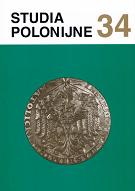Afrykańskie elity polskie i polonijne w drugiej połowie XX wieku. Studium politologiczne
The African Polish and Polonia Elites in the Second Half of the Twentietz Century. A politological Study (Sum.)
Author(s): Jacek KnopekSubject(s): Cultural Essay, Political Essay, Societal Essay
Published by: Towarzystwo Naukowe KUL & Katolicki Uniwersytet Lubelski Jana Pawła II
Keywords: Polonia; Polonia elites; Africa
Summary/Abstract: This article pinpoints Polish and Polonia elites functioning in the Black Land in the second half of the twentieth century. The basic sources for this paper was Agata and Zbigniew Judycki's study entitled Polonia. Słownik biograficzny [Polonia. A Biographic Dictionary]. In this study, 827 figures were shown who lived at the turn of the twentieth and twenty first centuries, and how played the most important role in the Polish diaspora. We find 37 surnames in the dictionaries of those who lived on the African continent; this number made up 4,47% of the total study. This value was deemed relatively high because the general number of Poles and Polonia on the Black Land was estimated at 0,1%. The African Polish and Polonia personalities at the turn of the twentieth and twenty-first centuries, who might be treated as the elite, were characterized by high intellectual and professional standards. Almost all of them had graduated from universities, had learned degrees, and obtained further degrees in their professions or academic specializations. Most of the personalities in question were related to the South African region, especially the Republic of South Africa, but there were also persons living and working in North, West, Middle or East Africa. At the head of the Polish and Polonia African elites we find those working in the exact sciences or engineering. Moreover, the clergy and missionaries constituted a relatively numerous group; they were appreciated by the Catholic Church. The smallest group was represented by the representatives of the humanities and the social sciences. In the representative group one finds no artists, musicians, or filmmakers. It has been pinpointed that in the case of the Polish and Polonia settlements one should not apply the criteria that refer to the way elites function in Poland because a diaspora is characterized by specific traits, thus the elite character of the forms of activity should be understood in a broad sense.
Journal: Studia Polonijne
- Issue Year: 2013
- Issue No: 34
- Page Range: 109-120
- Page Count: 12
- Language: Polish

